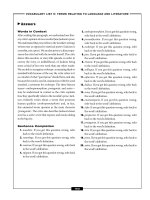1001 vocabulary & spelling questions
Bạn đang xem bản rút gọn của tài liệu. Xem và tải ngay bản đầy đủ của tài liệu tại đây (469.68 KB, 160 trang )
10 01
VOCABULARY &
SPELLING QUESTIONSNEW YORK
10 01
VOCABULARY
& SPELLING
QUESTIONS
2nd Edition
®
Copyright © 2003 LearningExpress, LLC.
All rights reserved under International and Pan-American Copyright Conventions.
Published in the United States by LearningExpress, LLC, New York.
Library of Congress Cataloging-in-Publication Data:
1001 vocabulary and spelling questions.—2nd ed.
p. cm.
ISBN 1-57685-473-6
1. Vocabulary—examinations, questions, etc. 2. English language—Orthog-
raphy and spelling—Examinations, questions, etc. I. Title: One thousand one
vocabulary and spelling questions. II. Title: One thousand and one vocabulary
and spelling questions. III. LearningExpress (Organization)
PE1449.A15 2003
428.1'076—dc22 2003015276
Printed in the United States of America
987654321
Second Edition
ISBN 1-57685-473-6
For more information or to place an order, contact LearningExpress at:
55 Broadway
8th Floor
New York, NY 10006
Or visit us at:
www.learnatest.com
Introduction vii
Prefixes, Suffixes, and Common Word Roots xi
SECTION 1
Synonyms, Antonyms, Verbal Classification,
and Analogies
1
Chapter 1 Synonyms 3
Chapter 2 Antonyms 11
Chapter 3 Synonyms and Antonyms 19
Chapter 4 Verbal Classification 29
Chapter 5 Analogies 33
SECTION 2
Vocabulary in Context 43
Chapter 6 Sentence Completion 45
Chapter 7 Reading Comprehension 55
Chapter 8 Synonyms in Context 67
Chapter 9 Choose the Right Word 75
SECTION 3
Spelling 79
Chapter 10 Choose the Correctly Spelled Word 81
Chapter 11 Choose the Correct Homophone 91
Chapter 12 Plurals, IE/EI Rule, and Prefixes and Suffixes 95
Chapter 13 Find the Misspelled Word 99
SECTION 4
Answer Explanations 113
Contents
v
ELCOME TO 1001 Vocabulary and Spelling Questions! This book is designed to provide
you with review and practice for vocabulary and spelling success. With 1001 practice
questions, you can enrich your verbal abilities at your own pace, and focus on the areas
where you need improvement. 1001 Vocabulary and Spelling Questions is designed for many audiences. It is
for anyone who has ever taken a language arts course and needs to refresh forgotten skills. It can be used to
supplement current class instruction. It can be used to boost job performance by improving your business
writing abilities. Most often, this book is used by people who are studying for important academic, entrance,
or certification exams. Every test from the SAT exam to the Police Sergeant test requires an excellent grasp
of vocabulary skills.
1001 Vocabulary and Spelling Questions can be used by teachers and tutors who need to reinforce stu-
dent skills. The book is easily adapted to fit lesson plans and for homework assignments.
If at some point you feel you need further practice or more explanation, you can find it in other
LearningExpress publications. 501 Vocabulary Questions, 501 Synonym and Antonym Questions, 501 Word
Analogies Questions, 501 Grammar and Writing Questions, and Vocabulary and Spelling Success in 20 Minutes
Introduction
vii
a Day, 3rd edition all contain a wealth of informa-
tion for students, test takers, professionals, and word
lovers.
How to Use This Book
First, look at the table of contents to see the types of
verbal topics covered in this book. The book is
organized in three sections: Synonyms, Antonyms,
Verbal Classification, and Analogies; Vocabulary in
Context; and Spelling. This structure divides com-
mon language arts strands into compact units so
that you can work on each concept and gain mas-
tery. You may want to answer the questions in
sequence, but if you are using this book to supple-
ment topics you are currently learning, you may
want to jump around from topic to topic according
to your syllabus.
As you answer the vocabulary and spelling
questions in this book, you will undoubtedly want to
check your answers using the answer and explanation
section at the end of the book. The purpose of “drill
and skill” practice is to help you become proficient
with language skills. Like an athlete preparing for the
next season or a musician warming up for a concert,
you can become an expert with practice. If, after
answering all the questions in a section, you feel you
need more practice, reread the questions and try your
hand at responding one more time. Repetition is
often the key to success. Studies show that most
repetitive tasks become part of a person’s inventory
of skills over time. A good idea is to write your
answers on a separate sheet of paper so that you can
go through the chapters over and over, as needed, to
reinforce and develop your word power.
Certain tests that you will take for academic
advancement, job promotions, or civil service/mil-
itary placement require you to have a working
knowledge of vocabulary and spelling skills. This
chart lists some exams that test your verbal skills and
word knowledge.
– INTRODUCTION–
viii
Tests that Measure Word Knowledge
Academic Tests Civil Service Military Job Placement
GED Exams Border Patrol Exam ASVAB PPST
PSAT Exam Firefighter Exam Military Flight CBEST
Aptitude Exam
SAT Exam Police Officer Exam Real Estate
Agent/Broker
State assessment Police Sergeant Exam EMT Basic
exams—typically
given in grades 8-12
COOP/HSPT Exam Postal Worker Exam Nursing Assistant
Exam
College Entrance Exams Corrections Officer Administrative/
Executive Assistant
GRE test Federal Clerical Exam
Miller Analogies Test Treasury Enforcement Agent
Exam
You should have a dictionary or thesaurus
handy as you work through the questions in each
section. It is always a good idea to make this a habit
when doing any kind of language activity. Another
helpful resource—a list of common prefixes, suffixes,
and word roots—follows this introduction. Under-
standing the parts of a word gives you clues about
its definition, and this can help you when you take
tests, write reports, or make speeches.
Make a Commitment
Success does not come without effort. Make the
commitment to improve your verbal skills. A rich
vocabulary is both a great asset and a great joy. When
you have an extensive vocabulary, you can provide
precise, vivid descriptions; you can speak more flu-
ently and with more confidence; you can understand
more of what you read; and you can read more
sophisticated texts. A good vocabulary can enrich
your personal life, help you achieve academic suc-
cess, and give you an edge over others in the work-
place. You can truly gain the proverbial verbal
advantage.
Additional Resources
If you feel you need even more practice, you might
want to purchase or borrow the following books:
Funk, Wilfred, et al. 30 Days to a More Powerful
Vocabulary (New York: Pocket Books, 2003).
Krevisky, Joseph. Random House Webster’s Pocket
Bad Speller’s Dictionary (New York: Random
House, 1998).
Lewis, Norman. Word Power Made Easy: The Com-
plete Handbook for Building a Superior Vocabu-
lary (New York: Pocket Books, 1995).
Morehead, Philip D. The New American Roget’s
College Thesaurus in Dictionary Form (New
York: Signet, 2002).
O’Connor, Joyce, et al, eds. Roget’s Desk Thesaurus
(New York: Random House, 2001).
Oxford Essential Spelling Dictionary (New York:
Berkley Publishing Group, 1998).
Shaw, Harry. Building a Better Vocabulary (New
York: Barnes & Noble Books, 1993).
Sorsby, Claudia. Spelling 101 (New York: St. Mar-
tin’s Press, 1996).
The Merriam-Webster Dictionary (Springfield:
Merriam-Webster, 1995).
The Merriam-Webster Dictionary of Synonyms and
Antonyms (Springfield: Merriam-Webster,
1994).
Word Power: 40 Workouts to Boost Your Vocabulary
(New York: Barnes & Noble Books, 1998).
Remember These
LearningExpress Books for
Extra Verbal Practice
LearningExpress. 501 Grammar and Writing Ques-
tions (New York: LearningExpress, 2002).
LearningExpress. 501 Synonym and Antonym
Questions (New York: LearningExpress, 2003).
LearningExpress. 501 Vocabulary Questions (New
York: LearningExpress, 2003).
LearningExpress. 501 Word Analogies Questions
(New York: LearningExpress, 2003).
LearningExpress. Vocabulary and Spelling Success
in 20 Minutes a Day, 3rd Edition (New York:
LearningExpress, 2002).
– INTRODUCTION–
ix
FAMILIARITY WITH COMMON prefixes, suffixes, and word roots can dramatically improve
your ability to determine the meaning of unfamiliar vocabulary words. The tables below list
common prefixes, suffixes, and word roots; their meanings; an example of a word with
that prefix, suffix, or word root; the meaning of that word; and a sentence that demonstrates the meaning
of that word. Refer to this section often to refresh your memory and improve your vocabulary.
Prefixes,
Suffixes, and
Common Word
Roots
xi
Prefixes
Prefixes are syllables added to the beginning of words to change or add to their meaning. This table lists some of
the most common prefixes in the English language. They are grouped together by similar meanings.
Prefix Meaning Example Definition Sentence
uni- one unify (v) to form into a single unit, to unite The new leader was able to unite the
three factions into one strong
political party.
mono- one monologue (n) a long speech by one person or I was very moved by the monologue
performer in Scene III.
bi- two bisect (v) to divide into two equal parts If you bisect a square, you will get
two rectangles of equal size.
duo- two duality (n) having two sides or parts The novel explores the duality of
good and evil in humans.
tri- three triangle (n) a figure having three angles In an isosceles triangle, two of the
three angles are the same size.
quadri- four quadruped (n) an animal with four feet Some quadrupeds evolved into
bipeds.
tetra- four tetralogy (n) series of four related artistic works, “Time Zone” was the fourth and final
such as plays, operas, novels, etc. work in Classman’s tetralogy.
quint- five quintuplets (n) five offspring born at one time Each quintuplet weighed less than
four pounds at birth.
pent- five pentameter (n) a line of verse (poetry) with five Most of Shakespeare’s sonnets are
metrical feet written in iambic pentameter.
multi- many multifaceted having many sides This is a multifaceted issue, and we
(adj) must examine each side carefully.
poly- many polyglot (n) one who speaks or understands It’s no wonder he’s a polyglot; he’s
several languages lived in eight different countries.
omni- all omniscient (adj) knowing all My teacher must be omniscient; she
always knows when I’m not paying
attention.
micro- small microcosm (n) little or miniature world; something Some people say that Brooklyn
representing something else on a Heights, the Brooklyn district across
very small scale the river from the Wall Street area, is
a microcosm of Manhattan.
mini- small minority (n) small group within a larger group John voted for Bridget, but he was in
the minority; most people voted for
Elaine.
macro- large macrocosm (n) the large scale world or universe; Any change to the microcosm will
any great whole eventually affect the macrocosm.
– PREFIXES, SUFFIXES, AND COMMON WORD ROOTS–
xii
Prefix Meaning Example Definition Sentence
ante- before antechamber (n) a smaller room leading into a larger The panel of jurors waited in the
or main room antechamber before entering the
court room.
pre- before precede (v) to come before in time or order The appetizers preceded the main
course.
post- after postscript (n) message added after the close of His postscript was almost as long
a letter as his letter!
inter- between intervene (v) to come between Romeo, trying to make peace,
intervened in the fight between
Tybalt and Mercutio.
inter- together interact (v) to act upon or influence each other The psychologist took notes as she
watched the children interact.
intra- within intravenous (adj) within or into a vein She could not eat and had to be fed
intravenously for three days.
intro- into, within introvert (n) a person whose attention is largely Unlike his flamboyant sister, quiet
directed inward, toward himself or Zeke was a real introvert.
herself; a shy or withdrawn person
in- in, into induct (v) to bring in (to a group) She was inducted into the honor
society.
ex- out, from expel (v) to drive out or away The rebels expelled the invaders.
circum- around circumscribe (v) to draw a line around; to mark She carefully circumscribed the
the limits of space that would become her office.
sub- under subvert (v) to bring about the destruction of, His attempt to subvert my authority
overthrow; to undermine will cost him his job.
super- above, over supervisor (n) one who watches over Alex accepted the promotion to
supervisor and was comfortable
with the duties and responsibilities of
the office.
con- with, together consensus (n) general agreement After hours of debate, the group
finally reached a consensus and
selected a candidate.
non- not nonstop without a stop With energy typical of the very
(adj, adv) young, the puppy ran nonstop
through the house.
in- not invariable (adj) not changing The weather here is invariable—
always sunny and warm.
un- not, against unmindful (adj) not conscious or aware of; forgetful For better or worse, he is unmindful
of office politics.
contra- against contradict (v) to state that (what is said) is untrue; I know we don’t have to agree on
to state the opposite of, be everything, but she contradicts
opposed to everything I say.
– PREFIXES, SUFFIXES, AND COMMON WORD ROOTS–
xiii
Prefix Meaning Example Definition Sentence
anti- against, antipode (n) exact or direct opposite North is the antipode of south.
opposite
counter- against, counter- working against production Complaining is counterproductive.
opposing productive (adj)
dis- not, away, dispel (v) to drive away; not having order To dispel rumors that I was quitting, I
opposite of scheduled a series of meetings for
the next three months.
disorderly (adj) messy, untidy, uncontrolled or unruly Two people were hurt when the
disorderly crowd took control of the
protest.
mis- wrong, ill misuse (v) to use wrongly She misused her authority when she
reassigned Charlie to a new team.
mal- bad, wrong, ill maltreat (v) to treat badly or wrongly After the dog saved his life, he swore
he would never maltreat another
animal.
malaise (n) feeling of discomfort or illness The malaise many women feel
during the first few months of preg-
nancy is called “morning sickness.”
pseudo- false, fake pseudonym (n) false or fake name Mark Twain is a pseudonym for
Samuel Clemens.
auto- by oneself or automaton (n) a robot; a person who seems to act The workers on the assembly line
by itself mechanically and without thinking looked like automatons.
co- together with; cohesive (adj) having a tendency to bond or stick Though they came from different
jointly together; united backgrounds and had many different
interests, they have formed a
remarkably cohesive team.
Suffixes
Suffixes are syllables added to the ends of words to change or add to their meaning. This table lists some of the
most common suffixes in the English language. They are grouped together by similar meanings.
Suffix Meaning Example Definition Sentence
-en to cause to broaden (v) to make more broad, widen Traveling around the world will
become broaden your understanding of other
cultures.
-ate to cause to resuscitate (v) to bring or come back to life or Thanks to a generous gift from an
be consciousness; to revive alumnus, we were able to resusci-
tate the study-abroad program.
– PREFIXES, SUFFIXES, AND COMMON WORD ROOTS–
xiv
Suffix Meaning Example Definition Sentence
-ify/-fy to make or electrify (v) to charge with electricity The singer electrified the audience
cause to be with her performance.
-ize to make, to alphabetize (v) to put in alphabetical order Please alphabetize these files for
give me.
-al capable of, practical (adj) suitable for use; involving activity as He has years of practical, on-the-job
suitable for distinct from study or theory experience.
-ial pertaining to commercial of or engaged in commerce Commercial vehicles must have
(adj) special license plates.
-ic pertaining to aristocratic (adj) of or pertaining to the aristocracy Though he was never rich or power-
ful, he has very aristocratic
manners.
-ly resembling, tenderly (adv) done with tenderness; gently, He held the newborn baby tenderly
having the delicately, lovingly in his arms.
qualities of
-ly in the boldly (adv) in a bold manner Despite his fear, he stepped boldly
manner of onto the stage.
-ful full of meaningful (adj) significant, full of meaning When Robert walked into the room
with Annette, she cast a meaningful
glance to me.
-ous/-ose full of humorous (adj) full of humor, funny His humorous speech received
laughter and applause from the
audience.
-ive having the descriptive (adj) giving a description The letter was so descriptive that I
quality of could picture every place he had
been.
-less lacking, painless (adj) without pain, not causing pain The doctor assured me that it is a
free of painless procedure.
-ish having the childish (adj) like a child; unsuitable for a grown He didn’t get the job because of his
quality of person childish behavior during the
interview.
-ance/ quality or tolerance (n) willingness or ability to tolerate a He has a high level of tolerance for
-ence state of person or thing rudeness.
-acy quality or indeterminacy state or quality of being The indeterminacy of his statement
state of (n) undetermined (without defined made it impossible to tell which side
limits) or vague he favored.
-tion act, state or completion (n) the act of completing; the state of The second siren signaled the
condition of being completed or finished completion of the fire drill.
-or/-er one who does narrator (n) one who tells the story, gives an A first-person narrator is usually
or performs account of not objective.
the action of
– PREFIXES, SUFFIXES, AND COMMON WORD ROOTS–
xv
Suffix Meaning Example Definition Sentence
-atrium/ place for arboretum (n) a garden devoted primarily to trees They built a deck with an arboretum
-orium and shrubs for their bonsai tree collection.
-ary place for, sanctuary (n) a sacred place, refuge With three noisy roommates, Ellen
pertaining to frequently sought the quiet
sanctuary of the library.
-cide kill pesticide (n) substance for killing insects This pesticide is also dangerous for
humans.
-ism quality, state optimism (n) belief that things will turn out for the Her optimism makes people want to
or condition best; tendency to take a hopeful be around her.
of; doctrine of view of things
-ity quality or morality (n) state or quality of being moral He argued that the basic morality of
state of civilized societies hasn’t changed
much over the centuries.
-itis inflammation tonsillitis (n) inflammation and infection of Her tonsillitis was so severe that
of the tonsils doctors had to remove her tonsils
immediately.
-ment act or judgment (n) ability to judge or make decisions He exercised good judgment during
condition of wisely; act of judging the meeting and did not challenge
his supervisor.
-ology the study of zoology (n) the scientific study of animal life Because of her strong interest in
zoology, she took an unpaid
summer job at the zoo.
Common Latin Word Roots
Many words in the English language have their origins in Latin. The table below shows the original Latin words
that have been used to create various English words. The Latin words serve as roots, providing the core meaning
of the words. Prefixes, suffixes, and other alterations give each word its distinct meaning. The word roots are listed
in alphabetical order.
Root Meaning Example Definition Sentence
amare to love amorous (adj) readily showing or feeling love She told him to stop his amorous
advances as she was already
engaged.
audire to hear audience (n) assembled group of listeners or The audience listened intently to the
spectators; people within hearing riveting speaker.
bellum war antebellum (adj) before the war In American history, antebellum
refers to the period before the Civil
War.
– PREFIXES, SUFFIXES, AND COMMON WORD ROOTS–
xvi
Root Meaning Example Definition Sentence
capere to take captivate (v) to capture the fancy of The story captivated me from the
beginning; I couldn’t put the book
down.
dicere to say, speak dictate (v) to state or order; to say what needs She began to dictate her notes into
to be written down the microphone.
duco to lead conduct (v) to lead or guide (thorough) He conducted a detailed tour of the
building.
equus equal equilibrium (n) a state of balance I have finally achieved equilibrium
between work and leisure.
facere to make manufacture (v) to make or produce The clothes are manufactured here
or do in this factory.
lucere to light lucid (adj) very clear No one could possibly have mis-
understood such a lucid explanation.
manus hand manicure (n) cosmetic treatment of the fingernails A manicure is not only important
hygiene, but clean and neat nails
also tell a great deal about a person.
medius middle median (n) middle point; middle in a set The median household income in
of numbers this wealthy neighborhood is
$89,000.
mittere to send transmit (v) to send across The message was transmitted over
the intercom.
omnis all, every omnipresent present everywhere That top-40 song is omnipresent;
(adj) everywhere I go, I hear it playing.
plicare to fold application (n) putting one thing on another; His loan application was denied
making a formal request because of his poor credit history.
ponere/ to place position (n) the place a person or thing occupies Although he is only 22, he holds a
positum very powerful position in the
company.
protare to carry transport (v) to carry across The goods will be transported by
boat.
quarere to ask, inquiry (n) act of inquiry, investigation, or The inquiry lasted several months
question questioning but yielded no new information.
scribere to write scribe (n) person who makes copies of The scribe had developed thick
writings calluses on his fingers from years of
writing.
sentire to feel sentiment (n) personal experience; one’s own After reading the collection of letters,
feeling it was easy to tell the sentiments of
the writer.
– PREFIXES, SUFFIXES, AND COMMON WORD ROOTS–
xvii
Root Meaning Example Definition Sentence
specere to look at spectacle (n) striking or impressive sight The debate was quite a spectacle;
the candidates made accusations
about each other that were un-
expected and slightly unprofessional.
spirare to breathe respiration (n) the act of breathing His respiration was steady, but he
remained unconscious.
tendere to stretch extend (v) to make longer, stretch out Please extend the deadline by two
weeks so we can complete the
project properly.
verbum word verbatim (adj) word for word The student failed because she had
copied an article verbatim instead of
writing her own essay.
Common Greek Word Roots
Many English words have their origins in the ancient Greek language. The table below shows the Greek words
that have been used to create various English words. The Greek words serve as roots, providing the core mean-
ing of the words. Prefixes, suffixes, and other alterations give each word its distinct meaning. The word roots are
listed in alphabetical order.
Root Meaning Example Definition Sentence
bios life biology (n) the science of living organisms He is majoring in biology and plans
to go to medical school.
chronos time chronological arranged in the order in which things The story is confusing because she
(adj) occurred did not put the events in chronologi-
cal order.
derma skin dermatology (n) branch of medical science dealing She has decided to study
with the skin and its diseases dermatology because she wants to
find a cure for skin cancer.
gamos marriage, polygamy (n) the practice or custom of having Polygamy is illegal in the United
union more than one spouse or mate States.
at a time
genos race, sex, genocide (n) the deliberate extermination of one The recent genocide in Bosnia has
kind race of people created a crisis in orphaned children.
geo earth geography (n) the study of the Earth’s surface; the The geography of this region made
surface or topographical features of it difficult for the different tribes to
a place interact.
graphein to write calligraphy (n) beautiful or elegant handwriting She used calligraphy to address her
wedding invitations.
– PREFIXES, SUFFIXES, AND COMMON WORD ROOTS–
xviii
Root Meaning Example Definition Sentence
krates member of democrat (n) one who believes in or advocates I have always been a democrat, but
a group democracy as a principle of I refuse to join the Democratic Party.
government
kryptos hidden, secret cryptic (adj) concealing meaning, puzzling He left such a cryptic message on
my answering machine that I don’t
know what he wanted.
metron to measure metronome (n) device with a pendulum that beats She used a metronome to help her
at a determined rate to measure keep the proper pace as she played
time/rhythm the song.
morphe form polymorphous having many forms Most mythologies have a
(adj) polymorphous figure, a “shape
shifter” who can be both animal and
human.
pathos suffering, pathetic (adj) arousing feelings of pity or sadness Willy Loman is a complex character
feeling who is both pathetic and heroic.
philos loving xenophile (n) a person who is attracted to foreign Alex is a xenophile; I doubt he’ll ever
peoples, cultures, or customs come back to the States.
phobos fear xenophobe (n) person who fears or hates foreigners Don’t expect Len to go on the trip;
or strange cultures or customs he’s a xenophobe.
photos light photobiotic (adj) living or thriving only in the presence Plants are photobiotic and will die
of light without light.
podos foot podiatrist (n) an expert in diagnosis and treatment The podiatrist saw that the ingrown
of ailments of the human foot toenail had become infected.
psuedein to deceive pseudonym (n) false name George Eliot is a pseudonym for
Mary Ann Evans.
pyr fire pyromaniac (n) one who has a compulsion to set The warehouse fire was not an
things on fire accident; it was set by a
pyromaniac.
soma body psychosomatic of or involving both the mind and In a psychosomatic illness, physical
(adj) body symptoms are caused by emotional
distress.
tele distant telescope (n) optical instrument for making distant While Galileo did not invent the
objects appear larger and nearer telescope, he was the first to use it
when viewed through the lens to study the planets and stars.
therme heat thermos (n) insulated jug or bottle that keeps The thermos kept my coffee hot all
liquids hot or cold afternoon.
– PREFIXES, SUFFIXES, AND COMMON WORD ROOTS–
xix
VOCABULARY &
SPELLING QUESTIONS
SECTION
1
Synonyms,
Antonyms,
Verbal
Classification,
and Analogies
T
HIS SECTION CONSISTS of five chapters of different types of vocabulary
questions. Questions vary from finding similar words to finding dissimilar
words, from identifying analogies, to identifying the three words that are sim-
ilar within a group of four words.
Most standardized tests use synonym and antonym questions to test verbal skills. The
first chapter in this section is on synonyms. A synonym is a word that means the same or
nearly the same as another word. You will be asked to find synonyms, or choose the word
that has the same or nearly the same meaning. In Chapter 2, you will identify antonyms,
or words that are most nearly the opposite of the word in italics. The questions in Chap-
ter 3 ask you to identify the word that is most similar or dissimilar to another word, effec-
tively testing your knowledge of two words. Chapter 4 tests your ability to identify groups
of word as similar to one another. You do this by finding the word in the list of four that
does not belong with the other three words. Finally, in Chapter 5 you are asked to iden-
tify word analogies. Analogies are comparisons. To answer an analogy question, look for
a relationship between the first set of words. Then, look for a similar relationship in the
second set of words. Choose the answer that best completes the comparison.
1. Which word means the same as erroneous?
a. digressive
b. confused
c. impenetrable
d. incorrect
2. Which word means the same as grotesque?
a. extreme
b. frenzied
c. hideous
d. typical
3. Which word means the same as garbled?
a. lucid
b. unintelligible
c. devoured
d. outrageous
4. Which word means the same as expose?
a. relate
b. develop
c. reveal
d. pretend
CHAPTER
Synonyms
1
3









